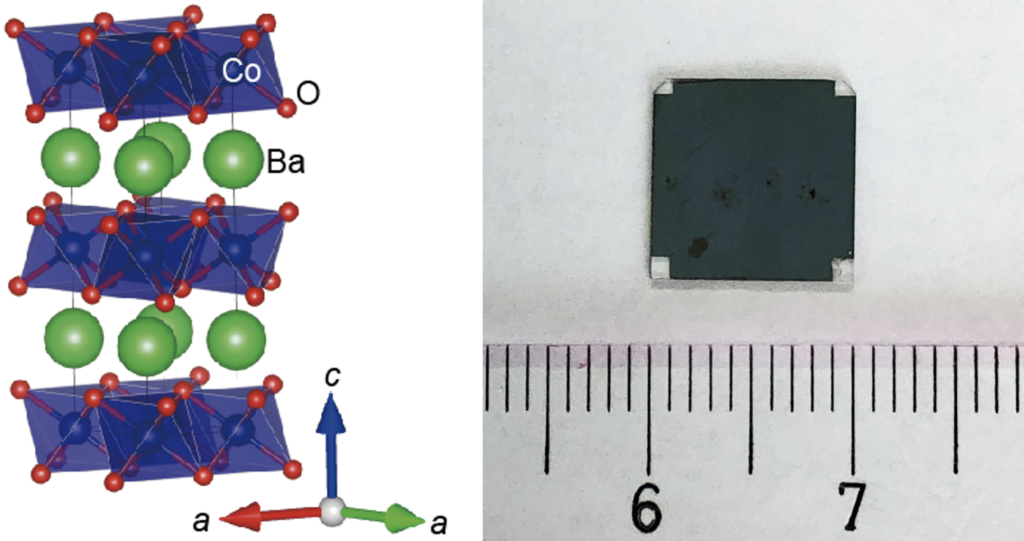
The crystal structure of the barium cobalt oxide film (left; Xi Zhang, Yuqiao Zhang, et al. ACS Applied Materials & Interfaces. July 12, 2022), and the metal oxide film itself (right; Photo: Hiromichi Ohta).
Waste heat is a huge potential source of energy conservation and reuse, through modifying this heat into electricity—a process known as thermoelectric conversion. Thermoelectric conversion devices that are available on the market are synthesized with the help of rare metals. While these seem to be highly efficient, they are costly and, in the majority of cases, utilize deadly materials.
Both these factors have resulted in such converters being of restricted use. One of the alternative choices is oxide-based thermoelectric materials; however, the main disadvantage these suffer from is a lack of proof of their stability at high temperatures.
A research group headed by Professor Hiromichi Ohta at the Research Institute for Electronic Science at Hokkaido University has synthesized a barium cobalt oxide thermoelectric converter that has appeared stable in a reproducible manner and effective at temperatures as high as 600 °C.
Their study outcomes were reported in the journal ACS Applied Materials & Interfaces.
Thermoelectric conversion has been determined by the Seebeck effect: when there is a temperature difference throughout a conducting material, an electric current is produced.
However, the efficiency of thermoelectric conversion relies on a figure known as the thermoelectric figure of merit ZT. Historically, oxide-based converters consisted of a low ZT, but recent research has disclosed several candidates that consist of high ZT. However, their stability at high temperatures was not well recorded.
For the past 20 years, Hiromichi Ohta’s group has been working on layered cobalt oxide films. In this study, the team wanted to analyze the chemical and thermal stability of such films, as well as quantify their ZT values at high temperatures.
The researchers tested cobalt oxide films layered with sodium, strontium, calcium, or barium, examining their resistivity, structure, and thermal conductivity.
They discovered that, of the four variants, the barium cobalt oxide layered film maintained its stability with electrical resistivity and structural integrity at temperatures as high as 600 °C.
In comparison, the strontium cobalt oxide film was stable up to 450 °C and the calcium and sodium cobalt oxide films were only stable until 350 °C. The ZT of the barium cobalt oxide film increased with the temperature, thereby reaching approximately 0.55 at 600 °C, comparable to a few commercially available thermoelectric converters.
Our study has shown that barium cobalt oxide films would be excellent candidates for high-temperature thermoelectric conversion devices. In addition, they are environment friendly, giving potential for wide deployment.
Hiromichi Ohta, Professor, Research Institute for Electronic Science, Hokkaido University
Journal Reference:
Zhang, X., et al. (2022) Ba1/3CoO2: A Thermoelectric Oxide Showing a Reliable ZT of ∼0.55 at 600 °C in Air. ACS Applied Materials Interfaces. doi.org/10.1021/acsami.2c08555.